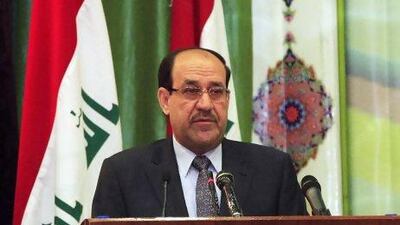There is a certain power to the word taqseem in Arabic. It means any form of partition of a country, and has a cloud of connotations that can invite memories of colonial times and conspiracies by western-backed religious or ethnic minorities.
That is why it is interesting to observe that the idea of decentralisation is, for the first time, being pushed by Iraq's Sunnis, who are a majority in all Muslim countries except Iran and Iraq.
Interest in federalism is not new in Iraq. It has been growing almost since the prime minister, Nouri Al Maliki, assumed the position of interior minister in 2010, as his attempt to centralise power grew more pronounced. Since then, he has marginalised Sunni-majority areas, politically and economically.
What is new, however, is that federalism offers a solution to a problem that is now more urgent than ever. Decentralised governance appears to be the only way to avoid an inevitable return to the sectarian abyss, one likely to be even more deadly than the events of 2006.
Iraq's current crisis, with ominous bombings targeting both Sunni and Shia areas, is essentially caused by the stagnant political system, not by Mr Al Maliki, who has a popular base that cannot be ignored. The power-sharing system set in motion (or in stone, as it turned out) by the 2005 constitution has led to economic and political paralysis, leaving Sunni Iraqis feeling that they are disenfranchised, second-class citizens.
Sunnis feel that the state failed to protect them and that the central government is and always will be controlled by sectarian parties that oppress or marginalise them. It is only a matter of time before Sunni-majority areas explode.
In the current political order, the idea of coexistence is an illusion, plain and simple. Deep Sunni resentment of the central government is shown by the fact that extremist forces are side by side with pro-change protesters and tribal notables who once fought them alongside the central government.
To be sure, Sunnis are still deeply divided over the idea of federation. Sheikh Abdulmalek Saadi, an influential Sunni cleric and mufti, has declared any calls for federalism to be haram, or religiously prohibited. Instead, he calls for dialogue with the Maliki government to address Sunnis' legitimate demands, including anti-Baathification and antiterror laws that are seen as designed to target them.
On the other hand, this month residents of Fallujah held an unprecedented conference on the merits of federalism. The way one speaker argued for federalism underlines the psychological bias against the idea: he gave the example of five brothers in one house - as they grow up and marry and have children, their infighting becomes intolerable.
"What's the solution?" he asked. "The clear solution, which we all know, is that the brothers move out and each has his own house. That way, they will be able to bring up their children as they wish, and protect themselves and prosper."
The calls for federalism in Sunni-majority areas are increasingly wrapped in sectarian language, which can be understood in the current context of religious polarisation. If the situation persists, this can lead only to greater radicalisation of the Sunni populace - which was once predominately secular - as Sunnis find shelter in traditional tribal and religious alliances.
Federation has security and economic aspects. Would the Sunni population, whose technocrats have long been targeted by government security forces or compelled to leave the country, be able to handle security in their provincial areas? Will the power vacuum be filled by better-armed extremist forces?
These factors must be considered before any transition to a federal system. But it is clear that the persistent crisis is empowering extremists.
When Sunnis handle their own affairs in their regions, they are most likely to repudiate extremism. The marriage of convenience between tribes and jihadists would almost definitely break as Sunnis take up ownership of their own regions.
The rampant corruption of the central government, and the lack of political will, impedes progress in Sunni-majority areas. Services and investment are desperately needed. Provincial governments, which would receive their shares of the national wealth, could answer to their local constituencies and would therefore be more likely to devote themselves to good governance and development in their regions, along with security - as demonstrated by the largely autonomous Kurdish north.
And yet, even if Sunni Iraqis agreed on governing themselves, Mr Al Maliki remains ready to strike down any such proposal. However, if there were a Sunni consensus on the issue, Mr Al Maliki would have little leeway to continue to reject it. Federalism is spelt out in the 2005 constitution and the executive procedures law No. 13, 2008, a constitution that the prime minister tirelessly cites to justify his authoritarian moves.
Federalism makes economic, political and security sense for Iraq, for both Sunni-majority areas and the nation at large. In the current toxic environment, a renewed sectarian war seems all too likely. Paradoxically, federation could bring Iraqis closer to each in the long run, as they start to take ownership of their regions and then understand that they need each other for trade and security.
Only when the brothers move into separate houses do they start to value their kinship.
On Twitter: @hhassan140

